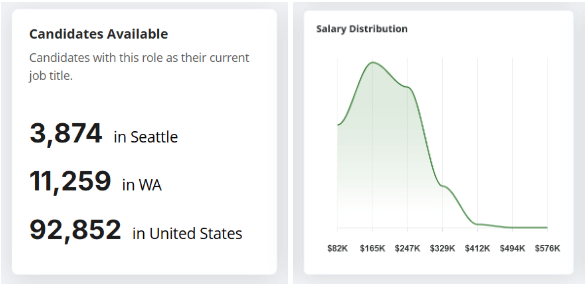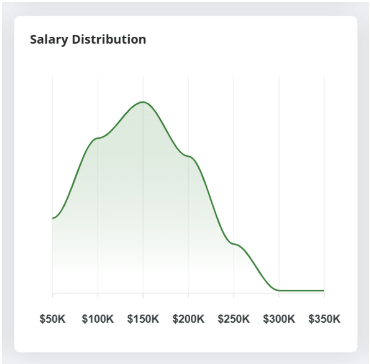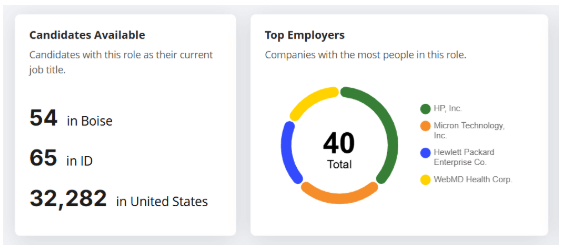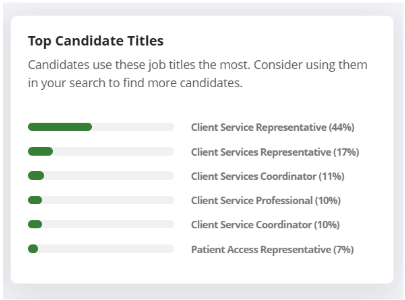My organization is considering posting a job as either hybrid or remote—how can I understand how that decision changes the available candidate market?
Many companies are turning to remote and hybrid roles where possible because they increase the size of your talent pool while potentially lowering salary costs. But how do you know if the juice is worth the squeeze?
Raise Talent Intelligence provides both salary data and talent pool sizes for a wide range of job titles—just search for “Systems Architect” in “Seattle, WA” and you’ll see this:

Here, we can see that by opening up your search to include remote workers in Washington State alone, you can triple your candidate pool.
Note the salary distribution peaking around 165K per year: if we instead search for “Spokane” instead of “Seattle” we see that same salary peak around 150K.

While the candidate pool in Spokane is considerably smaller, that is only one of the many potential locations outside your office geography—populated by people who might have a lower cost of living and be able to take a slightly lower salary. (And if you’re worried about fraud during remote interviews, check out Raise’s IT Skills-Based Hiring Platform here: https://raiserecruiting.com/skills-based-hiring/).
Some roles will merit a wider net than others—if you’re looking for an AR Specialist instead, and find a sizable candidate pool close to your office, you can confidently post the job as hybrid.
I know that the hire I’m trying to make is somewhere between difficult and impossible—how can RTI help me show stakeholders that we should try pivoting to another strategy?
Sometimes, despite our best efforts, it just isn’t possible to make a hire given the constraints involved. It could be the geography, or salary constraints—but no matter what you do, and every candidate isn’t interested.
Sometimes the way forward has to be rescoping the hire—and Raise Talent Intelligence can definitely help here.
Let’s say we’re trying to hire a Digital Product Manager in Boise, ID, and we can’t get a single candidate to bite through job ads or LinkedIn searches. Let’s see what RTI has to say:

Here we can see two reasons why we’re having trouble—one, the available pool of candidates is tiny, and two, we’re up against some big, established companies that have more resources than a small or medium-business would.
To make matters worse, we see that the small output of sample candidates include at least 2 that aren’t likely to move from their current positions (determined from how long those candidates have stayed in previous positions, etc.).

You might already have other tools and channels for understanding difficult hires—maybe your leadership is already aware of the problems. But even still, showing relevant data points can’t
hurt.
Between some good data and anecdotal evidence from the search we can make a case for rescoping the hire: are there any internal candidates who could be trained into the role? Are we able to expand our search by making the role remote? Can we shift the scope of the role and hire someone with a slightly different skill set to do the job?
It’s impossible to move forward if you don’t know where you stand on a hire—and RTI can help you understand where you are so you can get where you need to be.
My candidate search isn’t turning up the right candidates—how do I find the right job title and skills for the people I’m really looking for?
This is a common problem—particularly when your hire doesn’t have a standard job title and set of responsibilities.
RTI can help you find the right people by supplying the most common job titles in the category of jobs you’re looking for.
Take a look at what RTI puts out for “Client Services Representative” in Houston, TX:

Here, there are a whole bunch of related search terms which basically add up to the same thing—the person we’re looking for is in a client-facing delivery role without a major sales component. “Coordinator,” and “Professional” are potential search terms we can use to find more candidates.
This feature can also be helpful for difficult perm hires—things like C-level roles that require a nuanced understanding of job titles and skills.
If you have a role you’re struggling to find the right people with, just put the title into RTI and see what other terms you could be looking for!
Wrap
Talent Intelligence platforms are powerful tools—when used correctly, they can empower you to make a range of decisions based on evidence, and give you new options for making difficult hires.
If you’re having trouble making a hire and want help from an expert team, you can always reach out to Raise and see how we can help with difficult hires.

